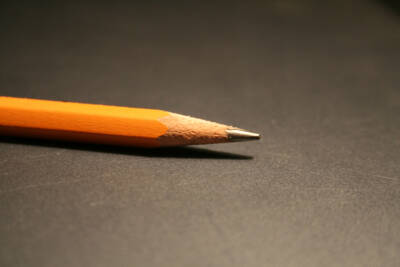The author began writing with a No. 2 Pencil and ink pen whose nib could be dipped into an inkwell set into a desk.
As we age, Robert Burn’s 1796 “Auld Lang Syne” — literally “old long since” in the Scots language or “for old times’ sake,” as we might say — becomes more meaningful.

As the world we knew recedes further from time-present and begins to look more and more like an old movie (Casablanca) or museum exhibit, ‘The History of the Type-writer,” auld-ers are likely to shed a tear when “Should auld acquaintance be forgot” is played on New Year’s Eve, but they shouldn’t weep into their cups.
I say this as someone who began writing at P.S. 187 Manhattan with a No. 2 Pencil and ink pen whose “nib” a “pupil” could dip into a little inkwell set into a desk.
If you are left-handed, as I am, it was difficult to move from left to right without smearing ink. I would have done better writing in Arabic or Hebrew, but I was able nonetheless to dip a braid of the girl in front of me into the well and watch the dye rise.
I sometimes wish the PC never had been developed. It was easier to replace a broken type-writer “key” than having a computer crash along with essential files.
I realize this kind of retro-history can be taken as a form of morbid nostalgia, especially if placed in the context of the latest world-changing scientific and technological advances.
We are living, after all, in a time as transformational as the mid-19th century that understood itself increasingly through the works of Darwin, Freud, and Einstein as well as the shift in literary taste and technique from Dickens’ carnival of three dimensional Rodin-like characters to the psychological and linguistic mazes of Henry James, James Joyce, Kafka, and Virginia Woolf.
We’re at the dawn of a new age. For starters: new possibilities for the creation of energy (“fusion ignition”), NASA’s “Perseverance Rover” gathering dirt on Mars, and the Large Hadron Collider Beauty (LHCB) – these advances and other extraterrestrial and subatomic observations more than suggest that some young person in 3023 will look back at Google as I regard the No. 2 Pencil.
But, wait, I predict that the No. 2 Pencil still will be useful for writers when Google has vanished in the Cloud. The pencil has an ancient history, but didn’t really make a mark until Shakespeare’s era (1610) and only became widely used in American when Henry David Thoreau’s father (John), who owned a pencil factory (1824-1852), invented the No. 2 whose graphite was neither too soft nor too hard.
Henry David Thoreau made his extensive diary entries and sketches of flora and fauna in pencil. Many of these graphic observations reappeared in Walden (1854).
This enduring American classic – one that represents many of the best values of American Democracy – will be, I hope, just as important as an ethical guide and ecological for our national life in 2023 as it is now.
The pencil remains a tool for the support and expansion of democratic institutions. No individual anywhere in the world is too poor to own a pencil and some sheets or paper, though many are too infirm and ill-fed to put these tools to work.
Social and economic progress often begins when a an impoverished and marginalized person writes an autobiography that reveals what it means to be treated as an “outsider.” Richard Wright’s 1945 Black Boy is a prime example.
Wright didn’t need, though he would have appreciated, the affluent circumstances of Virginia Woolf’s life that enabled her to write in worldly comfort her 1929 Feminist essay, “A Room of One’s Own,” which she delivered at Cambridge University in 1928.
Although he could afford an inkwell and quill, President Lincoln, always in touch with the deprivations of his Kentucky origins, made some revisions in pencil of the Gettysburg address at the Wills home the evening before the event.
The pencil as well as the pen turned out to be just as powerful as the sword.
This, then, is my New Year’s resolution: to recognize that a long life makes one more a sequoia than a weeping willow. Hard earned judgment, wisdom, a deep sense of history, and modesty in recognition of life’s complexities enable us still to be moral guides for following generations as we explore new dimensions of our brains and the cosmos.
So: if you think you’re yesterday’s newspaper, sharpen a No. 2 pencil and embrace your kinship with it.
I’m sure there will be one with an eraser and sharpener on board the fusion-powered Mayflower 11 of the future.
Howard R. Wolf (Emeritus Professor of English, SUNY-Buffalo) thinks of himself as an antiquarian and futurist.
- Red States in the Sunset - August 10, 2023
- A Robin Hood Rerun - July 26, 2023
- Space Exploration: In Dreams Begin Responsibilities - July 3, 2023

